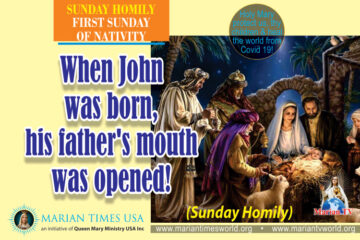SUNDAY HOMILY: SIXTH SUNDAY OF EPIPHANY

~ Fr. Abraham Mutholath, Chicago, USA. ~
(John 3:22-31)
INTRODUCTION
John the Baptist who came to prepare the way of the Lord was sure of his role. Even before Jesus taught on servant leadership, John practiced it. John’s disciples were upset that Jesus who came to receive baptism from John was baptizing along with his disciples. Jesus was gaining more popularity than John. Instead of people coming to John, they were all going to Jesus. This was intolerable for them and so they brought that to the attention of John. However, John taught them that Jesus was right and he should increase and John should decrease. Thus John is a great model of humility and healthy transition of authority.
Bible Text
Interpretation
(John 3:22) After this, Jesus and his disciples went into the region of Judea, where he spent some time with them baptizing.
After this
According to the chronology of John the Evangelist, after attending the wedding at Cana in Galilee (John 2:1-12), Jesus went up to Jerusalem to celebrate the feast of Passover where he cleansed the Temple and had dispute with the Jews (2:13-25). Then Jesus had a long discourse at night with Nicodemus who was a Pharisee and member of the Sanhedrin (John 3:1-21). The evangelist documents that after the discourse with Nicodemus, Jesus and his disciples went into the region of Judea for baptizing people.
Jesus and his disciples went into the region of Judea
The discussion of Jesus with Nicodemus might have been somewhere in Jerusalem because the conversation happened after the cleansing of the Temple in Jerusalem and Nicodemus being a member of the Sanhedrin might havebeen livingin the city. After meeting with Nicodemus, Jesus and his disciples had moved out of Jerusalem to a region or countryside in Judea.
he spent some time with them baptizing.
One of the themes of Jesus’ preaching was similar to that of John proclaiming: “Repent, for the kingdom of heaven is at hand.” (Matthew 4:17). So the repented sinners might have been seeking Jesus for baptism. So he, along with his disciples, also went to River Jordan somewhere in the region of Judea. John documentedthat “Jesus was making and baptizing more disciples than John” (John 4:1). John later clarified that it was not Jesus but his disciples who were performing the baptism (John 4:2) under the supervision of Jesus. This baptism was only an initial preparation with cleansing in water. The baptism in the Holy Spirit took place only after the descent of the Holy Spirit upon the apostles on the day of Pentecost.
So imitating John, Jesus might have asked the disciples to help the people for repentance and prepare them to become members of his church that would be established later. How long this baptism of Jesus took place is not given in the gospel. However, scholars calculate it as eight months. After that Jesus returned to his Galilean ministry.
(23) John was also baptizing in Aenon near Salim, because there was an abundance of water there, and people came to be baptized,
John was also baptizing in Aenon near Salim
The location where Jesus and his disciples were baptizing is not specified in the gospel. However, the location where John was baptizing, after meeting with Jesus, is specified. It was in Aenon near Salim. So, Salim might have been a well known place at that time though it is not exactly known now. Aenon in Aramaic means springs. So it could be a common name for many springs flowing to river Jordan and that must be the reason for referring to a spring (Aenon) near Salim. Because John the Evangelist specifies Judea as place Jesus selected for baptism, it is believed to be a valley six miles north-east of Jerusalem.
there was an abundance of water there
John the Evangelist gives reason for John selecting Aenon near Salim. Abundance of water was necessary for the immersion of converts for baptism. So that was an attraction for John to select as place for baptism.
people came to be baptized
People were going to John for baptism because it had to be done at River Jordan. Unlike Jesus, John who was a man of Nazirite vow was not going out to the people. However, his words were strong and attractive that people came to listen to him.
(24) for John had not yet been imprisoned.
The chronology of John’s gospel is different from that of the Synoptic gospels. So this verse is added to clarify that the event happened before the arrest of John the Baptist by King Herod Antipas. John could not preach or baptize after his imprisonment.
(25) Now a dispute arose between the disciples of John and a Jew about ceremonial washings.
The evangelist records a dispute that arose between the disciples of John the Baptist and a Jew about ceremonial washings. There were many practices of ceremonial washings, including immersion in water, for Israelites in the Old Testament. Some of them were similar to the baptism performed by John.
Before the ordination to priesthood, Moses washed Aaron and his sons with water as per the directive of God through Moses. (Lev. 8:6). On the Day of Atonement, Aaron had to bath his body in water before he robed his vestments to enter into the Holy of Holies. (Lev. 16:4). Those who have touched a human corpse were unclean for seven days and had to purify themselves with water on the third and seventh day as part of their ritual purification. (Numbers19:11-12).The new converts to Judaism had to undergo immersion in water known as Mikveh which was symbolic of transition from his or her old identity to a new one as a Jew.
The exact ceremonial washing and who the Jew involved in the dispute with the disciples of John are not specified by the evangelist. However, it must be related to the baptisms performed by John and the disciples of Jesus at nearby locations of River Jordan. Some Biblical scholars doubt whether the dispute was between Nicodemus and the disciples of John. Nicodemus had a lengthy discussion with Jesus on baptism. Jesus had told him: “Amen, amen, I say to you, no one can enter the kingdom of God without being born of water and Spirit.” (John 3:5). So Nicodemus or a Jew who might have learnt about the baptism in water and Spirit by Jesus, either from Jesus or from John, was arguing with the disciples of John that it was time for John to stop baptizing and everyone need to get the baptism from Jesus or his disciples who have started baptizing. John the Baptist himself had said: “I saw the Spirit come down like a dove from the sky and remain upon him. I did not know him, but the one who sent me to baptize with water told me, ‘On whomever you see the Spirit come down and remain, he is the one who will baptize with the holy Spirit.’Now I have seen and testified that he is the Son of God.” (John 1:32-34). This view is justified in the verses that follow and the response of John favoring the ministry of Jesus.
(26) So they came to John and said to him, “Rabbi, the one who was with you across the Jordan, to whom you testified, here he is baptizing and everyone is coming to him.”
The disciples of John might have been upset that someone who was baptized by John was now performing the same ministry of John at a nearby place and he was taking over John’s fame and clients. The disciples of John did not specify the name of Jesus though they were aware that John had testified him. Their concern was that a parallel baptism would diminish the flow of people for baptism to John because “everyone is coming to him.” They might have been curious to hear the response of John. They might have been expecting that John would prevent Jesus from performing the baptism in competition with him. That was a temptation brought up by the devil through the disciples to tempt John. However, John did not become envious of Jesus.
(27) John answered and said, “No one can receive anything except what has been given him from heaven.
Though John was making a general Theological statement, it was in reference to Jesus and him. John had witnessed the descent of the Holy Spirit upon Jesus and heard the voice of acknowledgement from heaven that was torn open at the baptism of Jesus. (Matthew 3:16-17). So the power of Jesus was given from above in the case of Jesus. John was also authorized from heaven but only as a witness to Jesus, the Son of God. (John 1:33-34). So the implied message of John to his disciples was that Jesus was right in what he was doing.
(28) You yourselves can testify that I said [that] I am not the Messiah, but that I was sent before him.
Since John had been baptizing, many doubted whether John was the Messiah. The Jewish leaders had associated baptism with the coming of the Messiah. That was why they sent priests and Levites to John asking him whether he was the Messiah, Elijah or the Prophet. (John 1:19-28). Only these three were supposed to baptize. When John said none of them, they questioned him for the reason of his act of baptism. John’s reply was based on Isaiah 40:3. “I am the voice of one crying out in the wilderness, ‘Make straight the way of the Lord,’ as the prophet Isaiah said.” Jesus later identified John with the second coming of Prophet Elijah (Mathew 17: 12-13) as prophesied by Malachi in 4:5-6. So, John was reiterating to his disciples that he was not the messiah, but the one sent before the Messiah to prepare his way as he had declared early in their presence.
(29) The one who has the bride is the bridegroom; the best man, who stands and listens to him, rejoices greatly at the bridegroom’s voice. So this joy of mine has been made complete.
The one who has the bride is the bridegroom; the best man
John illustrated to his disciples the relationship between Jesus and himself using a familiar example of a wedding ceremony. Jesus is the bridegroom who is the center of attraction in the wedding ceremony along with his bride, the Kingdom of God or the church.
John presented himself in the position of the best man or literally, “the friend of the groom.” According to Jewish custom of marriage, the best man had a special role in the weddingincludingmaking arrangements for the marriage on behalf of the groom. The prominence and joy of the groom was the goal of the friend of the groom. Any envy or competition between the best man and the groom was improbable.
Jesus himself used the term bridegroom for him when he answered to the disciples of John who asked Jesus: “Why do we and the Pharisees fast much, but your disciples do not fast?” Jesus’ reply was “Can the wedding guests mourn as long as the bridegroom is with them? The days will come when the bridegroom is taken away from them, and then they will fast.” (Matthew 9:14-15).
So like the best man of a Jewish wedding, John was rejoicing that his mission has accomplished. People began to realize the true bridegroom and began to approach him.
(30) He must increase; I must decrease.”
Once the best man’s role was over, he had to retreat from the scene and let the bridegroom take over. John was satisfied that his mission was successfully accomplished. It was time for him to go behind the curtain. Thus, John did not want to project himself but wanted to lead all to Jesus.
John’s approach to the situation was in contrast to an Old Testament event in the transition stage of King Saul to his successor David. When David, the anointed second King of Israel, became popular, King Saul got jealous and was chasing to kill him (1 Samuel 18:6-9). All his attempts were in vain because the Spirit of the Lord was upon David. King Saul had warned his elder son Jonathan: “For as long as the son of Jesse lives upon the earth, you cannot make good your claim to the kingship! Now send for him, and bring him to me, for he must die.” (1 Samuel 20:31). However, Jonathan kept a good friendship with David and protected his life from assassination attempts of his father. Jonathan said to David: “Have no fear, my father Saul shall not lay a hand to you. You shall be king of Israel and I shall be second to you. Even my father Saul knows this.” (1Samuel 23:17). Though King Saul wanted his son Jonathan to be his successor, Jonathan was behaving like John the Baptist, preparing the way for the enthronement of David, God’s anointed king, and considered himself as second to him. (1 Samuel chapters 19-24).
(31) The one who comes from above is above all. The one who is of the earth is earthly and speaks of earthly things. But the one who comes from heaven [is above all].
There is no clarity on whether this verse and the following verses in this chapter are the words of John the Baptist or of John the Evangelist. Regardless of whose words they are, they are consistent with the theme presented so far and later by Jesus himself.
A contrast is made here between the words of divine origin that came from Jesus and the words that were spoken by others who are of human origin. Jesus has no human father and he is the God incarnate. So he is above all in position including John the Baptist. The humans always think and speak from earthly perspective out of their limited knowledge. Whereas, Jesus could reveal the divine truth and that was above all other preaching. This reiterated the disciples of John that they should honor Jesus and John cannot be in competition with Jesus, the Son of God.
Message
1. After baptizing Jesus, John continued his mission. When he came to realize that Jesus also started baptizing with his disciples, John was not jealous of Jesus. He was only happy that more people were going to him than to John. Jealousy is the enemy of spirituality and humility is the road to success and honor.
2. Though John’s disciples were jealous of the emergence of Jesus and his disciples, John corrected them and directed them to Jesus. John was sure that it was time for him to wind up. A confrontation or competition would have caused damage to John’s reputation. We also should be vigilant in handling conflicts in the family, in the church and in the community like John did.
3. The disciples of John and people in Judea and Jerusalem had doubted whether John was the Messiah. He did not want any undue claim for himself. However, Jesus gave a good witness of John saying: “Amen, I say to you, among those born of women there has been none greater than John the Baptist.” (John 11:11). When we behave as humble servants, God will exalt us in due time.
4. When John heard about the baptism offered by Jesus, John said:“this joy of mine has been made complete.He must increase; I must decrease.” (John 3:29-30). Everyone should promote the growth of others and find joy in it.
5. John did not try to gain anything for himself but wished all for the glory of Jesus. As we serve in the family, church, and world, let us lead others to the glory of Jesus the way, the truth, and the life so that all reach heaven through Jesus.
6. Transition of authority whether in the family, church, or in secular field should be done with a spirit that John showed us in handing over his mission to Jesus. The role we have in this world is not permanent. We need to have a good succession plan and a smooth transition of authority following the model of John.









